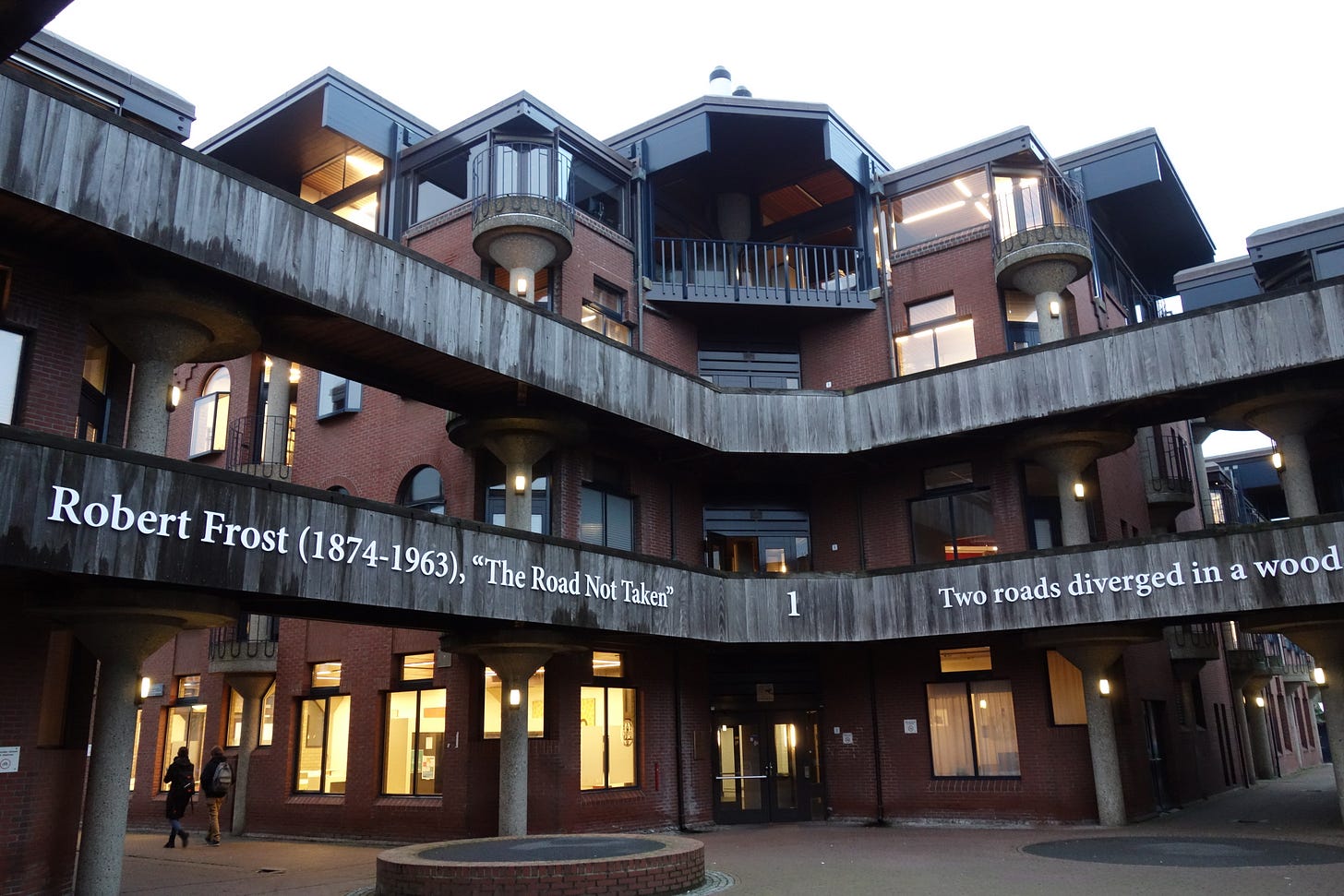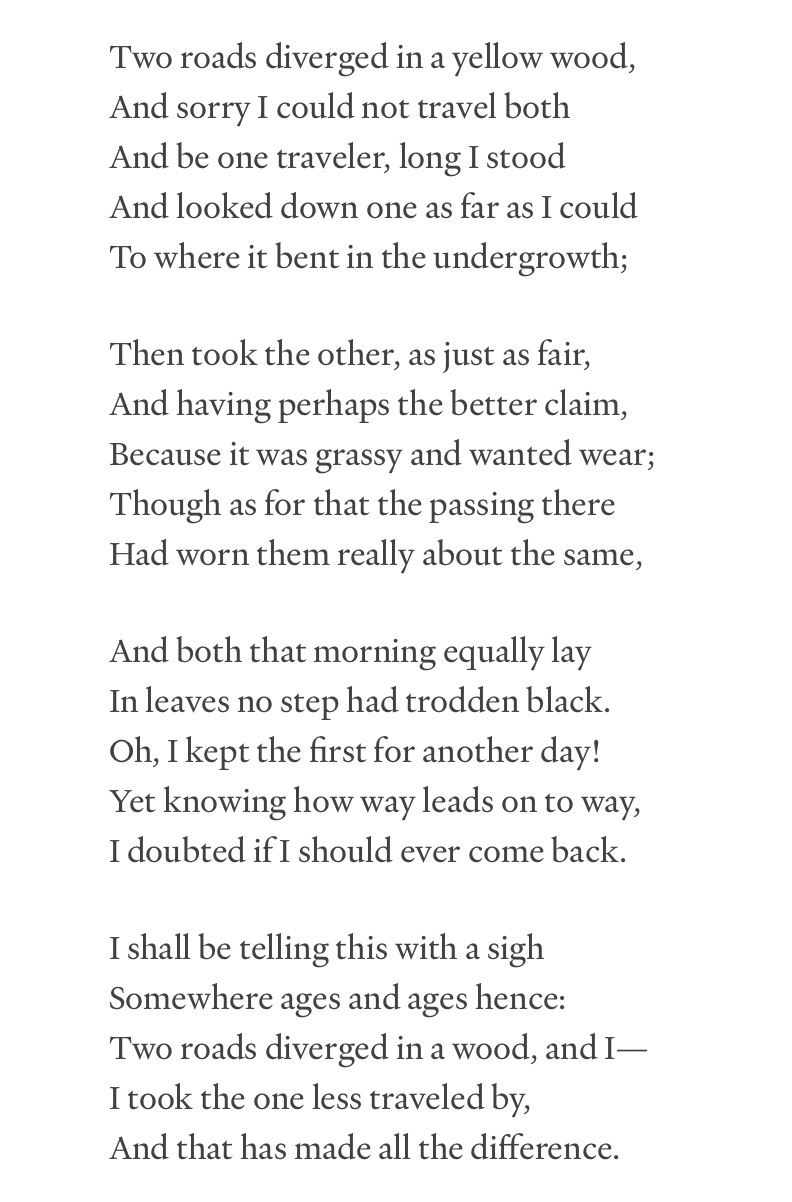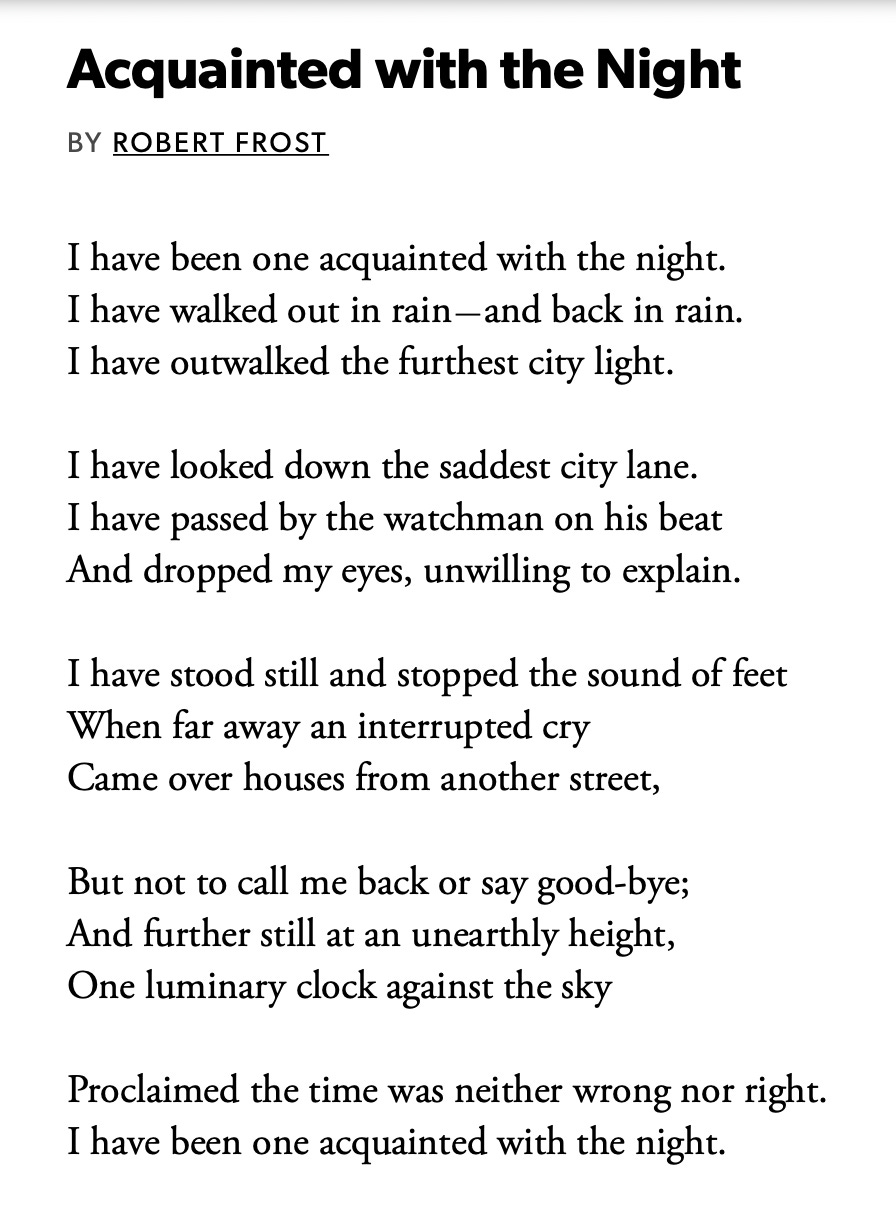22. I have outwalked the furthest city light.
Robert Frost, "Acquainted with the Night"(1928) and "The Road Not Taken" (1915)
Tonight, along with 6 friends and 5500 others, I will walk a marathon through the night to raise money for Stichting Vluchteling (Refugee Foundation). [Sponsor us here!] Called the “Nacht de Vluchteling” (Night of the Refugees), this charity provides emergency services and advocacy for refugees here in The Netherlands and around the world. Since the Syrian refugee crisis, this foundation has organized a fundraising walk in which, all across the Netherlands, teams walk from one place to another in the dead of night. We leave at midnight (!) in Rotterdam, and 40km later, (hopefully!) arrive at the beach in Den Haag by 9am.
So, in honor of this adventure we will undertake together tonight, I wanted to ruminate on two pairs of worn out shoes: a pair of poems by Robert Frost (1874-1965) about walking: “The Road Not Taken”(1915) and “Acquainted with the Night”(1928). To my mind these poems are yin and yang, night and day, light and darkness — so together then, they can tell us something about walking and life.
Robert Frost, that well-known, yet uncharacterizable American poet of the New England style, wrote in “Education in Poetry” that “Poetry provides the one permissible way of saying one thing and meaning another.” Let’s start with the more famous of the two, The Road Not Taken" (1915), which 100% says one thing and means another.
First published in the Atlantic Monthly in 1915, the lore is that this poem began as a ribbing of his friend and walking buddy Edward Thomas. On their walks together during Frost’s three year stint in England, Thomas would be racked with indecision when the paths diverged, and Frost took it upon himself to make fun, poetically, of his friend’s worry that he had taken the wrong path. When Thomas died in WWI, this poem became tinged in retrospect with regret for his decision to enlist, a decision that “made all the difference.”
In his whole damn book about the poem, and how we read it wrong critic David Orr writes:
But this isn’t just any poem. It’s “The Road Not Taken,” and it plays a unique role not simply in American literature, but in American culture —and in world culture as well. Its signature phrases have become so ubiquitous, so much a part of everything from coffee mugs to refrigerator magnets to graduation speeches, that it’s almost possible to forget the poem is actually a poem.
Just to keep things local, here is the poem as it appears on a University building for my faculty at Leiden University:

It is an unpoem, the anti-poem. It is a poem that takes over your speech pattern and rhythm and makes you recite it, like the pledge of allegiance. The formal characteristics are simple, three iambs per line with a few missteps thrown in to make you stumble on the path. The last line is different and it is about difference.
“And that has made all the difference.”
It is different, and it sounds conclusive, but that is a lie. This is a poem about the uselessness of decision, the wantonness of choice, masquerading as a poem about individualism. Clearly the University wants students to align with the message of individual creativity and blue-sky-thinking, but the poem itself pushes back. Let me explain.
“The Road Not Taken” splits into roughly three timeframes, determined by the ends of the sentences. The first sentence goes on meandering through three stanzas, and it seems to occur in the present moment. Beginning in a fairy tale, “Two roads diverged in a yellow wood” the speaker tries to ascertain which way to take. And yet, and yet, and yet, I hear them say, as they start line after line with “And.” Then they get to a decision: “Then took the other as just as fair.”
Throughout the period of indecision, one repetitive image becomes clear: the paths are “really about the same.” They are “equally” justifiable. Writes Orr, “The roads are interchangeable.”
The second moment comes in a retrospect. The speaker is perhaps a little down the path, questioning and bargaining with themselves: Oh! I will keep that one for another day! But, I probably won’t ever come back this way again. Resigned to their choice, the genius of this little poem starts to creep in with the third movement:
“I shall be telling his with a sigh/ Somewhere ages and ages hence:”
Another timeframe emerges — someday far in the future, when looking backward, this impulsive decision between two equally fine options will be transmuted into a narrative of choice and self-determination. The fact is we get one go at this life, and since “I could not travel both/and be one traveller” the decision has to be made. The criteria for the decision rises from an impulse to use one’s feet to mow the grass, but here, many ages hence, they will rationalize and reframe that decision *with a sigh* and give it meaning. When telling the story of our lives, of how this or that outcome came to pass, this choice will grow important.
But is it really? Do we feel relief from the weight of decision making? or regret for not making the other choice? Wait: is this a commentary on self-deception? The famous last three lines are an armchair reflection that stitches together a consolidated self with an I—[line break, pause for emphasis]— I:
“Two roads diverged in a wood, and I—/I took the one less traveled by, /And that has made all the difference.”
This last line sticks out conversationally, out of rhythm from the rest. (If you are not familiar with Frost’s poetics, you should know that this is always, always done on purpose). The speaker has convinced themselves, and us too perhaps, that they acted as brave individualists, striking out where no human has gone before, by taking the less traveled road. Hooey. They made a choice between equals, and in the dangerous way that our brains reframe and rebrand our past, they have taken out the “yellow” (traditionally a symbol for cowardice) and given this choice a self-congratulatory meaning.
But notice, the title. In the end, it’s “The Road Not Taken” that subsumes our imagination. The title is not a celebration of the path less taken, but of the one not taken, the other path, the one that got away. If we’re being honest, that’s the path that we ruminate on.
More brave choices come through in the other poem for today, “Acquainted with the Night.”
This dramatic lyric is formally very interesting. It uses contemporary and natural-sounding language, starting out with end-stopped lines, statements of fact not feeling that all begin the same way: I have [verb]+[preposition]. The rhyme form is the terza rima, a braid invented by Dante for the Divine Comedy: ABA BCB CDC DAD, with a couplet at the end that relates back to the beginning: AA. Like a sonnet it has 14 lines, and the last two are the kicker. Not for nothing is this poem written in the rhyme-scheme of an ancient Italian poem about the soul’s journey after death through hell, purgatory, and then heaven. Frost does that — he shoehorns everyday Americanese into complex formal shapes and strict rhythms, granting meaning and timelessness to ordinary speech.
This poem is a whole mood. Rather than the light banter of the previous poem, the speaker is solitary and their relationship with world around them seems one of disconnection. A cry breaks out in the night but is interrupted, cut off by silence, and though the speaker stops their footsteps to hear the rest, it does not come. The watchman’s bid for connection is refused. No one “calls me back or says goodbye.”
They are outside time. They are outside the city limits. The poem offers a “metaphysical homelessness” wrote scholar Frank Lentricchia long ago, the vibe of “a self in an inhospitable universe” where nothing is forthcoming. Many critics read this poem as a meditation on depression, a brave admission that the speaker is “acquainted” with walking in this darkness.
The poem also harbors a holding back from the edge of darkness, a hopeful return from the Inferno. They walk in rain, and “back in rain.” They look down the “saddest city lane” but do not turn to follow it down. The domestic cry does not ask for containment, and say goodbye or call them back. Like a sentinel, the archetypal watchman allows them to pass without a word. The final couplet can read as a release from the moral universe of “wrong” and “right.” There is no wrong or right time to take a walk beyond the city limits, to explore the darkness.
Wish me luck!






